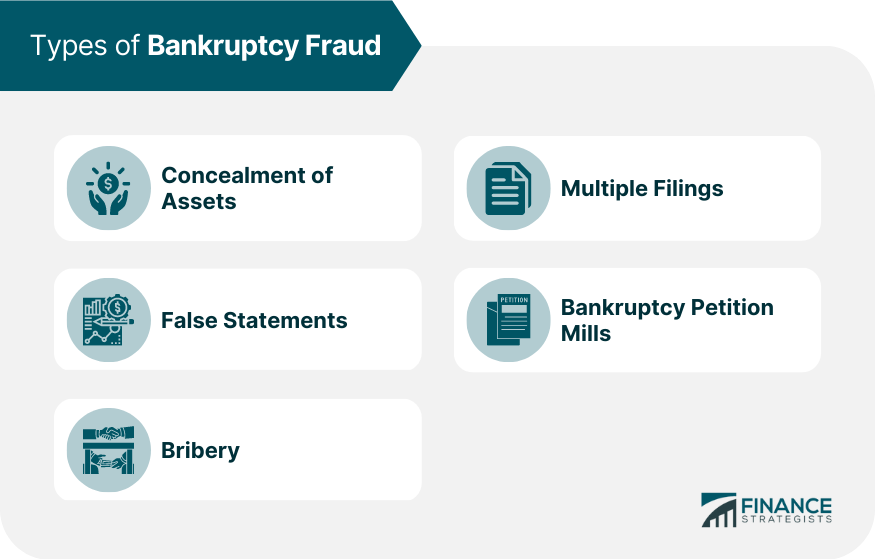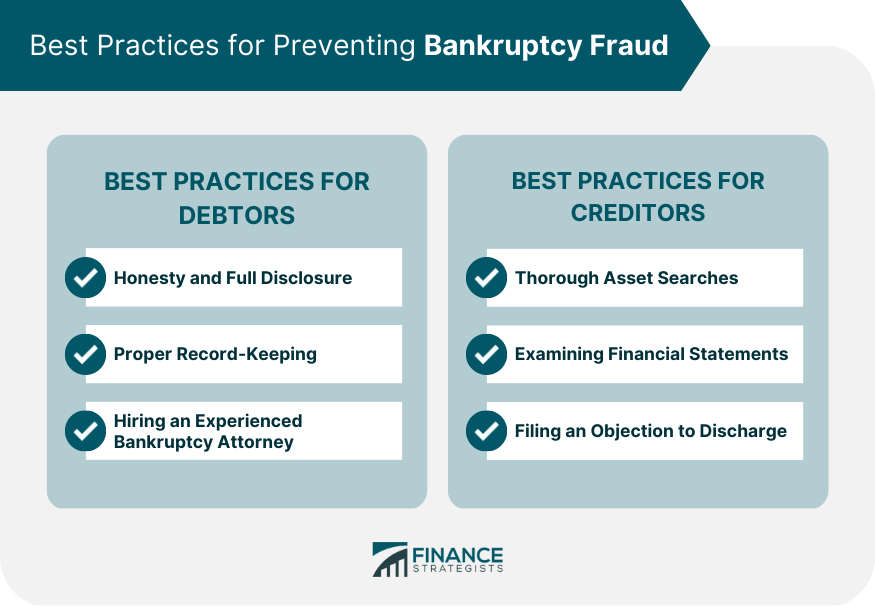Bankruptcy fraud is a type of financial fraud that occurs when an individual or company intentionally provides false information or conceals assets during the bankruptcy process. It can take many forms, from concealing assets to bribing bankruptcy officials, and it can have serious legal and financial consequences for those involved. Understanding the types of bankruptcy fraud, the consequences of committing it, and how to prevent and report it are important steps in protecting oneself and the integrity of the bankruptcy system. Several common types of bankruptcy fraud include the concealment of assets, false statements, bribery, multiple filings, and bankruptcy petition mills. One of the most common forms of bankruptcy fraud is the concealment of assets. This occurs when an individual or company fails to disclose assets that should be included in the bankruptcy estate. For example, someone may transfer assets to a friend or relative before filing for bankruptcy or fail to disclose income from a second job or rental property. Concealing assets can have serious consequences, including denial of discharge, fines, and criminal charges. Another type of bankruptcy fraud is making false statements. This occurs when an individual or company provides inaccurate information on bankruptcy forms or during bankruptcy. For example, someone may lie about their income or debts, or they may falsify documents to make it appear that they have more debt than they do. False statements can result in the denial of discharge, fines, and criminal charges. Bribery is another form of bankruptcy fraud that occurs when an individual or company offers money or other incentives to a bankruptcy official in exchange for favorable treatment. This can include offering a bribe to a bankruptcy trustee in exchange for approval of a plan or paying off a bankruptcy judge to rule in favor of a particular outcome. Bribery is a serious criminal offense that can result in fines and imprisonment. Multiple filings occur when an individual files for bankruptcy in multiple jurisdictions or multiple times within a short period. This can be a form of bankruptcy fraud if the individual attempts to conceal assets or abuse the bankruptcy system. Multiple filings can result in the dismissal of the bankruptcy case, fines, and criminal charges. Bankruptcy petition mills are businesses that offer to help individuals file for bankruptcy but often provide poor or fraudulent services. This can include charging high fees for basic services, providing false information or advice, or even filing false bankruptcy petitions on behalf of clients. Bankruptcy petition mills can result in severe legal and financial consequences for both the individuals involved and the integrity of the bankruptcy system. The consequences of bankruptcy fraud can be severe, ranging from civil penalties to criminal charges and imprisonment. Civil penalties can include fines, repayment of debts, and denial of discharge. Criminal charges can result in fines and imprisonment, with penalties ranging from a few months to several years, depending on the severity of the offense. In addition to legal consequences, bankruptcy fraud can have a lasting impact on an individual's credit score and financial reputation. There are several best practices that individuals and companies can follow to prevent bankruptcy fraud. For debtors, they should follow the following: The most important step in preventing bankruptcy fraud is being honest and upfront about all assets, debts, and other financial information. This means providing accurate information on bankruptcy forms and disclosing all income and assets. Working with a qualified bankruptcy attorney ensures all legal requirements are met. Proper record-keeping is also essential to preventing bankruptcy fraud. This includes keeping detailed records of all financial transactions, including income, expenses, and debts, and maintaining accurate and up-to-date financial statements. Keeping good records can help to prevent misunderstandings or disputes during the bankruptcy process and can also provide evidence in the event of fraud allegations. Working with an experienced bankruptcy attorney who can provide guidance and support throughout the bankruptcy process is important. A qualified attorney can help individuals and companies navigate the complex legal and financial requirements of bankruptcy, ensure that all necessary information is provided, and help to avoid potential pitfalls or legal issues. Creditors can also take steps to prevent bankruptcy fraud, including: Creditors can conduct thorough asset searches to identify potential concealed assets or fraudulent activity. This can include reviewing financial statements, conducting background checks, and working with legal and financial experts to identify potential red flags. Creditors should also carefully examine financial statements and other documentation debtors provide during bankruptcy. This can help to identify any discrepancies or inconsistencies in the information provided and can also help to uncover potential fraudulent activity. Creditors can file an objection to discharge if they believe a debtor has engaged in fraud or abused the bankruptcy system. This can prevent the debtor from receiving a discharge of their debts and help protect creditors from fraudulent activity. Reporting bankruptcy fraud is an essential step in protecting the integrity of the bankruptcy system and ensuring that fraudulent activity is identified and prosecuted. Reporting options include: Individuals and companies can report suspected bankruptcy fraud to the appropriate authorities, including the Department of Justice, the Federal Bureau of Investigation (FBI), and the United States Trustee's Office. Reporting suspected fraud can help initiate an investigation and lead to criminal charges and penalties for those involved. Individuals who wish to report bankruptcy fraud anonymously can do so through the National Whistleblower Center or the Securities and Exchange Commission (SEC). These organizations allow individuals to report suspected fraud without revealing their identity and provide protections for whistleblowers who come forward with information. Whistleblower protection is also available for individuals who report suspected bankruptcy fraud. The False Claims Act and the Dodd-Frank Act provide protections for whistleblowers who come forward with information about fraudulent activity, including protection from retaliation and the potential for monetary rewards. Bankruptcy Fraud vs Bankruptcy Abuse It is important to note that not all behavior considered abusive in the bankruptcy process rises to the level of fraud. Bankruptcy abuse can occur when an individual or company uses bankruptcy to shield assets from creditors or gain an unfair advantage. This can include filing for bankruptcy to delay eviction or foreclosure or to avoid paying debts that could be discharged through bankruptcy. While this behavior may be considered abusive, it is not necessarily fraudulent and may not be subject to criminal charges. Bankruptcy fraud is a serious offense with severe legal and financial consequences. Understanding the different types of bankruptcy fraud, its consequences, and how to prevent and report it can help individuals and companies protect themselves and the integrity of the bankruptcy system. Best practices such as honesty, proper record-keeping, and working with experienced legal and financial professionals can go a long way in preventing fraudulent activity. Furthermore, reporting suspected fraud to the appropriate authorities or anonymous reporting options can help ensure that fraudulent activity is identified and prosecuted. If you need further guidance or assistance navigating the bankruptcy process, consider working with a qualified financial advisor. They can provide valuable insights and support to help you make informed decisions and protect your financial interests. Do not hesitate to seek the help of a professional when it comes to managing your finances and navigating the complex world of bankruptcy.What Is Bankruptcy Fraud?
Types of Bankruptcy Fraud
Concealment of Assets
False Statements
Bribery
Multiple Filings
Bankruptcy Petition Mills

Consequences of Bankruptcy Fraud
Preventing Bankruptcy Fraud
Best Practices for Debtors
Honesty and Full Disclosure
Proper Record-Keeping
Hiring an Experienced Bankruptcy Attorney
Best Practices for Creditors
Thorough Asset Searches
Examining Financial Statements
Filing an Objection to Discharge

Reporting Bankruptcy Fraud
Reporting Bankruptcy Fraud to Authorities
Anonymous Reporting Options
Whistleblower Protection
Conclusion
Bankruptcy Fraud FAQs
Bankruptcy fraud is a type of financial fraud that occurs when an individual or company intentionally provides false information or conceals assets during the bankruptcy process.
The consequences of bankruptcy fraud can range from civil penalties to criminal charges and imprisonment. Civil penalties can include fines, repayment of debts, and denial of discharge. Criminal charges can result in fines and imprisonment.
Individuals and companies can prevent bankruptcy fraud by being honest and upfront about all assets, debts, and other financial information, keeping accurate records, and working with experienced legal and financial professionals.
The common types of bankruptcy fraud include the concealment of assets, false statements, bribery, multiple filings, and bankruptcy petition mills.
Creditors can protect themselves from bankruptcy fraud by conducting thorough asset searches, examining financial statements, and filing an objection to discharge if they believe a debtor has engaged in fraudulent activity or otherwise abused the bankruptcy system.
True Tamplin is a published author, public speaker, CEO of UpDigital, and founder of Finance Strategists.
True is a Certified Educator in Personal Finance (CEPF®), author of The Handy Financial Ratios Guide, a member of the Society for Advancing Business Editing and Writing, contributes to his financial education site, Finance Strategists, and has spoken to various financial communities such as the CFA Institute, as well as university students like his Alma mater, Biola University, where he received a bachelor of science in business and data analytics.
To learn more about True, visit his personal website or view his author profiles on Amazon, Nasdaq and Forbes.















